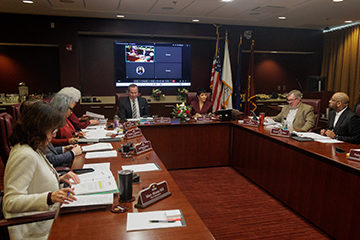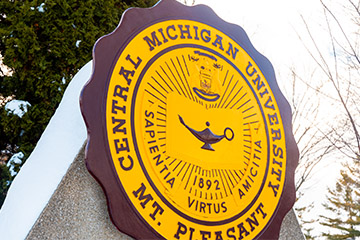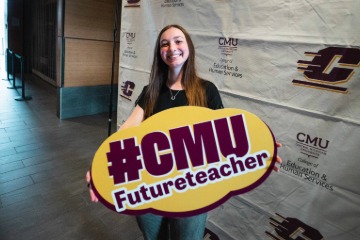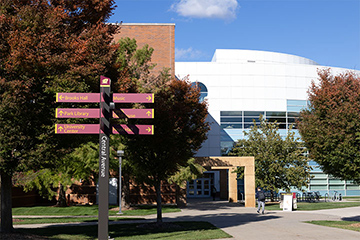CMU remains affordable, competitive with modest tuition increase
New operating budget invests in support for students
After freezing tuition rates last year, Central Michigan University maintained its commitment to keeping higher education as affordable as possible for students and families as the Board of Trustees approved a modest increase in 2021-22 tuition rates at its formal session this morning.
Tuition for incoming first-year undergraduate students — those with less than 56 credit hours — will increase by 1.92% from $417 to $425 per credit hour. CMU's tuition rate increase, which follows increases at most other Michigan colleges and universities, remains well below the governor's tuition increase cap of 4.2%.
"The board does not take lightly raising tuition, especially during this difficult time. But, after much deliberation and discussion, it is absolutely the responsible thing to do," said Trustee Ed Plawecki, chair of the finance and facilities committee.
In his opening report to the board, President Bob Davies noted the increase would have minor impact for many students based on CMU's merit scholarship structure.
"It is important to remember that CMU merit scholarships are tied to a percentage of tuition, not a dollar amount. This means that, for many students, the impact of these tuition increases will be minimal," Davies said.
Rates for continuing students and those in the upper-level tuition rate also will see conservative increases. All 2021-22 tuition rates are available here.
Even with these slight increases, CMU continues to be among the most affordable universities in the state. Among Michigan's 15 public institutions, 10 have tuition rates higher than CMU's.
In related action, trustees also approved rates for residential housing and dining, which will include expanded living and dining options. Residence hall and apartment rates were increased by 2.5% for the coming year.
Investing in students now and in the future
The board approved a $435 million operating budget for fiscal year 2022, which begins July 1. The budget allocates funds strategically to support CMU students and includes an expectation of flat revenues from state appropriations. Current state appropriations make up about 21% of CMU's revenue.
The 2021-22 budget is the first in 20 years not based on the Responsibility Center Management model. The new budget model instead takes into account prior years' expenditures and allows for informed decision-making about resource allocation aligned with strategic priorities, especially student success.
Student support areas benefiting from these investments include student mental health and well-being, mentoring programs to equalize degree attainment, career development, esports, and student diversity, equity and inclusion initiatives.
"I appreciate all of the efforts to look at all of the different alternatives, ultimately settling on a budget that prioritizes rigor, relevance and excellence and ensures all students are at the center of everything that we do," Trustee Regine C. Beauboeuf said.
CMU also continues to annually invest more in scholarships and financial aid for its students. The new budget includes nearly $50 million in institutional support — $10 million more than in the previous year.
The approved budget also includes:
- Strategic reallocation of resources from the President's Innovation Fund, including:
- $750,000 in initiatives that expand CMU's footprint into new markets and strengthen outreach efforts to new populations of students. This includes investing in technology and expanding recruitment into states throughout the Great Lakes region.
- $500,000 to support efforts to reclaim CMU's leadership in off-campus and distance learning, as well as programs to engage adult and nontraditional learners.
- A 1.5% staff salary increase.
- An increase in faculty salaries, per their current contract.
This year's budget also includes a revenue stream of approximately $10 million related to CMU's partnership with University Pediatricians. These funds are earmarked specifically for physician and staff salaries and operational costs associated with clinical spaces and research efforts.
Other board action
In other board action, trustees also approved departmental mergers and the establishment of a School of Politics, Society, Justice and Public Service in the College of Liberal Arts and Social Sciences. The new school will be created by merging sociology, social work, political science and public administration, which are currently housed within different departments.
Additional department mergers within the college include:
- The Department of Philosophy, Anthropology and Religion will be created by a merger of Anthropology, Philosophy and Religion.
- The Department of History, World Languages and Cultures will be created by a merger of History and World Languages and Cultures.
In other matters:
- Executive Vice President and Provost Mary C. Schutten presented an update on academic prioritization, which included the introduction of five key themes and 24 associated marquee programs. CMU will promote and heavily market these programs, ultimately raising overall interest in the university and its many program offerings.
- Trustees approved emeritus rank for 18 faculty and staff, 37 faculty promotions and 39 professor salary adjustments.
- Vice President for Advancement Heidi Tracy reported that funds from the CMU Alumni Relations Gold Membership Program will be used to name the CMU Alumni Island at the Chippewa Champions Center.
- Trustees approved authorization of a new charter school — Explore Academy in Novi, Michigan. The school will focus on strong core education and college readiness through the philosophy of student choice. Explore Academy's academic model will have three central components: increased individualized education, student accountability and college readiness.
President's report
In his opening report to the board, President Davies recognized a significant decrease in the number of new COVID-19 cases in the CMU and Mount Pleasant communities since late May. He also noted the importance for people to continue to consider vaccination.
"Our work is not yet done. Resuming the majority of our engaging in-person activities this fall depends heavily on our ability to prevent the spread of COVID-19. Right now, the most effective tool to prevent virus spread is vaccination, yet vaccination rates among young people are low in our state," he said.




